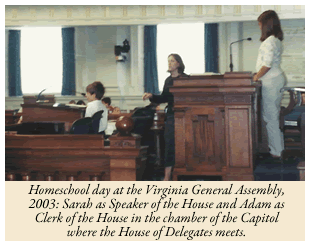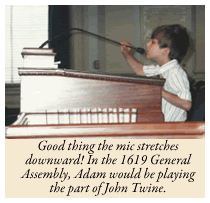 |
 The pewter pitchers stood lined up on a plank near the church. The pewter pitchers stood lined up on a plank near the church.
The church doors were open, allowing the dream that a breeze might come. But alas, no movement of wind, just the utter stillness of Virginia in July.
Tempie fanned herself. Actually, we all did as we listened to the proceedings inside.
The month before, Sir George had sent warrants to each of the eleven settlements requesting that the men assemble and elect two representatives each. Every free man and tenant had the right to vote. And toward the last of July, shallops and c anoes and small sails had filled the riverfront, all elected men coming to take their seats at the General Assembly. anoes and small sails had filled the riverfront, all elected men coming to take their seats at the General Assembly.
The summer had been another hot one, and hundreds more settlers were dying. The Company’s fine hopes for an ironworks had come to a halt, at least temporarily, with the death of Captain Blewitt, who was the artisan in charge of building them. Death exacted a great toll so that one never knew whether to fear summer sickness or winter famine more.
Most of these assembled representatives were well. But not all. George Yeardley, John Pory, and Master Shelley were ill among others.
Sir George had asked almost every household in James Cittie to lodge a representative. We were able to have Sam Jordan—a boon for Will, as he saw little of his old chamay or chum, an Indian word we had picked up.
|
 |
Maria looked exhausted. Caring for three children and being the pastor’s wife had taken its toll on her, I reckoned. Yet, undaunted, she was here to help.
All day for the next week or two—we knew not how long—we should be gathering water from the well for filling the men’s flagons. George Yeardley had asked us—Tempie, Maria, and me—to do this chore, as we were some of the most senior women in the colony. ’Twas a small task, but Sir George wanted us to slip in and fill flagons without interrupting. He added that we should be prepared to serve in other ways if necessary. The heat looked to be unbearable, and so we would alternate with Jane, Alice Peirce, and Isabella Pace. 
 This is why such a body is a good thing,” Maria said idly. “England cannot answer everything, the day-to-day challenges we have. The good Lord knows how many such things I’ve heard from my husband.” This is why such a body is a good thing,” Maria said idly. “England cannot answer everything, the day-to-day challenges we have. The good Lord knows how many such things I’ve heard from my husband.”
“They do not understand us in London, either. What we endure, what life is like on the frontier,” Tempie added.
And these thoughts lifted my heart. Perhaps we truly  were moving toward a civilized society. Perhaps by redressing wrongs we committed against the natives, peace would remain. Perhaps my grandchildren should not grow up in such a dangerous world. were moving toward a civilized society. Perhaps by redressing wrongs we committed against the natives, peace would remain. Perhaps my grandchildren should not grow up in such a dangerous world.
Perhaps.
The lawmaking continued.
“I propose no trading of dogs to the Indians!” Murmurs of assent. The Indians might indeed turn our mighty mastiffs and greyhounds against us.
From When the Moon Has No More Silver
by Connie Lapallo © 2011
|
 |




 anoes and small sails had filled the riverfront, all elected men coming to take their seats at the General Assembly.
anoes and small sails had filled the riverfront, all elected men coming to take their seats at the General Assembly.  were moving toward a civilized society. Perhaps by redressing wrongs we committed against the natives, peace would remain. Perhaps my grandchildren should not grow up in such a dangerous world.
were moving toward a civilized society. Perhaps by redressing wrongs we committed against the natives, peace would remain. Perhaps my grandchildren should not grow up in such a dangerous world.